Exponent II's Blog, page 94
November 19, 2022
The Holy Ghost as an Ambassador
My fourth child was recently baptized and he asked me to give a talk on the Holy Ghost. This has actually been my role four times and works well for me because I’m not always certain what I believe, but I love teaching my children about seeking good, finding light, and being kind. I’m often frustrated by the war/antagonist bent to some popular hymns and the portrayal of Christian soldiers. While that type of motivation has a place, I love to think of the Holy Ghost as a ambassador for Christ who leads us all to represent Him. For my blog post this week, I offer my baptismal Holy Ghost talk to my children:

You were born with a light in you. We were all born with this light, often called a conscience, which guides us to make good choices. Our conscience is also called the Light of Christ and this means each one of us has a divine energy for good within us.
In St. John Chapter 1, versus 6-9, it says:
6 ¶There was a man sent from God, whose name was John.
7 The same came for a witness, to bear witness of the Light, that all men through him might believe.
8 He was not that Light, but was sent to bear witness of that Light.
9 That was the true Light, which lighteth every man that cometh into the world.
Every person you meet has this light and the capacity for good. This light helps us know what is good and true and loving. After we’re baptized, we can receive the Gift of the Holy Ghost, which is like a super rechargeable battery for this light. The Holy Ghost helps strengthen that light within us and helps us better see what is good and true and loving. As we make choices that help us follow Christ, we keep recharging that battery so we can continue to see the world through the bright light of Jesus Christ.
There are many songs about “Christian soldiers” and we sometimes speak of warriors in the scriptures. The Holy Ghost, though, is someone unique. I like to think of the Holy Ghost as an Ambassador for Jesus Christ. An ambassador officially represents someone or something. Their job is diplomacy and they often leave their home country to build friendships with other countries. This means they leave the comfort of their home and familiar things to get to know new people, places, and cultures. An ambassador’s job is to find things they have in common and ways countries can work together for good. The job of the Holy Ghost is to show us the world as Jesus sees it.
When you have the Holy Ghost working within you to brighten your light, you can be an Ambassador for Jesus Christ too. You can go out into the world to seek light and to share light. Sometimes this can mean being a missionary or sharing something about your faith, but Ambassadors most often share light through their actions and choices. The most important thing the Holy Ghost helps you do is show others the light of Christ within them. This most often happens when we serve others, when we choose kind words, when we forgive faults and mistakes and when we include all kinds of different people.
As we grow older, choices are not always easy. Sometimes there is more than one good choice. Sometimes all of our choices have problems. This is where the Holy Ghost can help us shine Christ’s light on our choices. This light will help us have compassion and clarity. You’ve probably heard the popular phrase “What would Jesus Do?” That is exactly the question the Holy Ghost reminds us to ask in our hearts and minds when we need to make a choice.
The Holy Ghost will ask us:
Is it loving?
Is it helpful?
Is it honest?
Is it kind?
Does this choice bring more light?
In John 12: 36, Jesus tells us, “While ye have light, believe in the light, that ye may be the children of light.” As I’ve watched you grow, I’ve seen that light within you. Now, you can have the Holy Ghost as your companion and friend, helping you see that light and guiding you toward it. As you continue to be kind to others, to seek ways to serve, to find ways to spread good, that light will fill you. And, if you feel the light fading or struggle with hard times or sin or challenges, like we all do, the Holy Ghost can help lead you back toward that light and bring you comfort and peace.
As we ask these questions and try to be like Jesus Christ daily, we become more like him. Sister Cheiko Okazaki said, “Strength comes from faith in the Savior’s love and in the power of his atonement. If we trustingly put our hand in the Savior’s, we can claim the promise of the sacramental prayer to always have his Spirit with us.” This means that we don’t have to make perfect choices. We just have to keep trying and promising to try and be like Jesus. When our choices don’t bring us closer to Jesus, we can try again by trustingly putting our hand in the Savior’s. The Holy Ghost will be there to help us recharge our light by reading the words of Jesus Christ, serving others, and seeking the good around us.
Today, you are choosing to continue to follow that light within you as an Ambassador of Jesus Christ. You are loved more than you know by your mom, your dad, and your Heavenly Mother and Heavenly Father. We are all here to help and support you as you continue to shine your light and follow Jesus Christ.
November 17, 2022
Guest Post: Will men ejaculate responsibly and end unwanted pregnancies?
Guest post by Shelbey Neil, a graduate student, amateur thespian, and primary caregiver. After a lifetime of perfect politeness, she is thrilled to have finally embarked on her “villain era.”
 Gabrielle Blair and her new book, Ejaculate Responsibly: A Whole New Way to Think About Abortion
Gabrielle Blair and her new book, Ejaculate Responsibly: A Whole New Way to Think About AbortionPhotos from here and here
Gabrielle Blair’s newest book, Ejaculate Responsibly, is an epiphany. And the genius lies not in pointing out complex, hidden truths, but rather in pointing out obvious realities that have been both deliberately and accidentally obfuscated by ordinary and powerful people for as long as any of us hold memories. We all—knowingly or unknowingly—perpetuate the incredible imbalance of responsibility for unwanted pregnancies through our behavior and unexamined attitudes. Blair, in her new book, is urging us to stop.
This work, subtitled A Whole New Way to Think About Abortion, is a marvelously straightforward series of twenty-eight arguments whose entire purpose is to provide evidence for the claim inherent in the title: that the solution to reducing abortions is simply responsible ejaculations. And no, it’s not a bait-and-switch to trick politically pro-life people into yet another ineffective discussion on pro-choice talking points—moral, ethical, and philosophical arguments for or against abortions are completely absent. Blair puts a friendly arm around our shoulders, turns us around, and helps us see that by the time abortion is on the table, we’ve already missed the entire point.
Blair’s writing is unfussy, uncomplicated, and undeniable. It’s conversational, easy to devour, and repeats itself only when entirely necessary. The book is based on a viral Twitter thread she published in 2018 that has gotten an astounding 141,300 retweets (as of this writing) and still receives interaction on a daily basis, these four years later.
The genius of that Twitter thread and this book (which examines the same arguments, plus a few more) is that Blair saw the solution to abortion that has been right under our noses this whole time. She was the first one to publicly point out that irresponsible ejaculations are the real root cause of unwanted pregnancies. For decades, sexual conservatives have claimed that sex was the root cause (“If you don’t want a baby, don’t have sex”), but that is both biologically, logistically, and legally false, as Blair demonstrates masterfully and conversationally.
If you’ve read Blair’s Twitter thread and other similar content, many of these arguments will not be revelatory because you will have heard them from her or others before—or had the thoughts yourself. However, this book combines those points with several other important facets of the conversation such that all the main ideas can hang together nicely in one space and become, truly, an undeniable case for ejaculating responsibly. I, for one, appreciated how absolutely unflinching Blair—a mother of six—was about the incredible risks and dangers of pregnancy and the unfathomable workload that is parenting, without tying it up in pretty packaging at the end. Blair’s writing is so honest it took my breath away.
Now that Blair has issued the boundary lines for where women’s responsibility for unwanted pregnancies ends and men’s responsibility begins, here comes the scared waiting: Will men take responsibility for their ejaculations and end unwanted pregnancies? For men reading this, will you?
I agree with other reviewers: Ejaculate Responsibly is required reading, especially for men and teenage boys. Full stop.
New resources to study (and share) the teachings of Mormon feminist icons Eliza R. Snow and Emmeline B. Wells
 Journals of Emmeline B. Wells
Journals of Emmeline B. WellsAt the Exponent, we have long advocated that teachers in the Church of Jesus Christ of Latter-day Saints (LDS) quote women as frequently as they quote men. But finding quotes by LDS women can be challenging because women receive few of the speaking slots in General Conference and many of our manuals primarily quote men.
So I am downright giddy to announce that the LDS Church has released not one but two new online databases brimming with quotes by two of the most influential women in LDS history, Emmeline B. Wells and Eliza R. Snow.
There is no shortage of women’s quotes here. The Eliza R. Snow website contains 1,200 talks, and the Emmeline B. Wells website transcribes 47 journals. I’ve included some examples of stories and quotes you may find as you peruse these websites below.*
Emmeline B. WellsThe Diaries of Emmeline B. Wells
Emmeline B. Wells was editor of the nineteenth century feminist newspaper, the Woman’s Exponent, for which Exponent II is named. She was a suffrage movement leader, working with Elizabeth Cady Stanton and Susan B. Anthony, and led relief efforts following disasters such as the 1906 San Francisco earthquake.
Quote from Emmeline
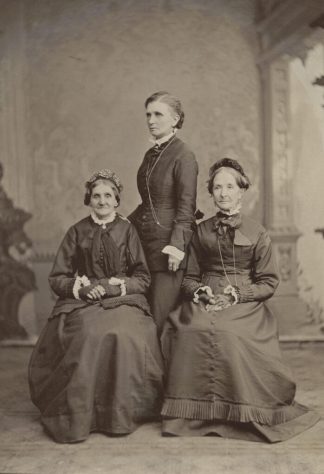 Emmeline B. Wells (center) and Eliza R. Snow (right) together with another Mormon feminist icon, Elizabeth Ann Whitney. Photograph by Charles R. Savage, circa 1876.
Emmeline B. Wells (center) and Eliza R. Snow (right) together with another Mormon feminist icon, Elizabeth Ann Whitney. Photograph by Charles R. Savage, circa 1876.“Responsibilities come thick and fast upon the women of Zion. Those who will must take up the burdens and carry them.” (June 12, 1888)
“This morning I presided over the General Congress in the Hall of Columbus—an honor never before accorded to a Mormon woman—if one of our brethren had such a distinguished honor conferred upon them it would have been heralded the country over and thought a great achievement.”
(May 20, 1893)
“I have desired with all my heart to do those things that would advance women in moral and spiritual as well as educational work and tend to the rolling on of the work of God upon the earth.” (August 1, 1895)
Pro-tip: Another great resource for quotes by Emmeline B. Wells is the Woman’s Exponent. Look for essays with the pseudonyms Blanche Beechwood and Aunt Em.
Eliza R. SnowThe Discourses of Eliza R. Snow
Eliza R. Snow was a powerful spiritual leader with the titles of “prophetess” and “priestess.” She was also known as “Zion’s poetess” and is the author of many hymns. Her hymn, O My Father (which was previously called by the less patriarchal title, Invocation, or The Eternal Father and Mother), is the only hymn in the current hymnal that celebrates Heavenly Mother. (Let’s hope there will be more in the upcoming new hymnal.)
Quotes from Eliza
“Our calling is great and noble. We are called not only to work, but to instruct, counsel and console. The mind needs food as much as the body—indeed must have it, or it will dry, wither and perish.” (May 26, 1868)
“If we have each a little of the right spirit and come together it is like putting coals of fire together. When they are separate they cannot burn and soon go out but when they are put together they soon burst out in a blaze,” (September 5, 1872)
“There are places for a mother to shine outside her home. This Society has a great scope of labor, not only in patching quilts.” (September 26, 1872)
*Spelling and grammar standardized
November 15, 2022
Guest Post: Woman in the Corner
Guest Post by Emmaly Renshaw. Emmaly is a mother of four, agricultural nonprofit director, lover of fields, woods, plants, and the Aldi aisle of shame. 
I wrestle with the idea of an eternity of becoming like the heavenly mother we are allowed to know, not the Heavenly Mother we need to know. Do I want an existence where my children only can communicate with my spouse as I fade into the background with barely an utterance of name, much less a relationship? In my search, I did what was prescribed, to search within defined sacred space.
This is what the temple teaches me as a woman: to take a silent seat on the side. Am I simply to become the woman in the corner at the command of the officiator? Or is the woman standing in the celestial room symbolic of Heavenly Mother? Why is she assigned to be a silent observer on the other side of the door and not present at the veil to surround us with open arms?
I enter the celestial room and see a woman standing there with hands folded in front of her, a quick flash of eye contact before her gaze drops back to the floor with a strained smile. Is this symbolic of Her? The last few times, I’ve lost my composure as I sit in this space with my grief as my faith shifts and fractures. And yet she stands there without response. Where is the woman willing to bury you in her bosom as you let it all go? The one to whisper, “This is part of the journey; I’ll help you sort it out in this space we consider sacred.” The only words she ever utters are, “Do you know your way to the dressing room?” as I head for the exit. My answer is yes. We’ve seen each other a dozen times at this exit door. I’m well aware of how to leave. Show me how to stay.
I went to the temple to find Her; I left without Her. Leaders ask why do you feel the need to search for more? Because I am a mother too. After 40 years, I search for Heavenly Mother in relegated spaces. It’s a daring journey, one without a map. I am discovering Her in the soft leaves underfoot off the prescribed paths where the morning fog envelopes you and silences the world. There is remorse that I didn’t get to know Her sooner, but I have daughters, and as they come of age, a gift I can give them is the authority to develop their relationships with the Divine.
November 14, 2022
Guest Post: The Conception of my Inner Voice
Guest Post by Amy. Amy enjoys reading, hiking in the mountains, and learning alongside her three children and husband in Orem, Utah.
My oldest child is turning 11 soon. Every year around his birthday, I reflect on the days leading up to his birth and simultaneously my birth as a new mother finding my inner voice.
My husband and I graduated from BYU, and just nine days later we fulfilled the next commandment by having a child. After all, “The greatest job that any woman will ever do will be in nurturing and teaching and living and encouraging and rearing her children in righteousness and truth. There is no other thing that will compare with that, regardless of what she does.”- Gordon B. Hinckley. My path was laid out for me. There was no discussion about any other option i.e. working after graduation, continuing with schooling, traveling for a time before starting a family, etc.
I went to the doctor that the nurses recommended. This doctor told me I needed to “put pictures up of you around your apartment with the words ‘don’t feed me’”. I only wanted to please him, so even though that comment devastated me, I tried not to gain any weight for the next appointment. Eventually, our baby’s due date came and went. I was also not dilated and 0% effaced. This is not uncommon for first babies, but I went to the hospital for a non-stress test. My amniotic fluid levels raised red flags for my medical team. The next day I got another NST and it showed my fluids were increasing to the point where I had enough to be carrying triplets. Everyone assured me it would be okay and this would give my doctor an excuse to get the baby out sooner. I felt excited when my doctor scheduled me for an induction the next morning. I had to ripen my cervix using Cervidil and was up the whole night. I would finally see this baby soon; no one led me to believe there was anything to be anxious about. They were the experts, after all.
The next morning, the nurses started my IV and pitocin. At his convenience, my doctor broke my water before I got my epidural. It was excruciatingly painful with my posterior cervix. And it was enough water to spill over the bed. I finally received the epidural and the waiting game started. I labored all day long. The doctor came to me and said “you can either push for 3 hours and struggle or I can get him out within 15 minutes with my forceps”. Being the peacemaker that I was, and also someone who relied on the knowledge of others, I thought I would please him and my family members who were all there waiting for me and get him out sooner with the forceps. After all, he was the doctor and knew better than me, and I didn’t want people waiting!
The anesthesiologist gave me a “whopper dose”; my legs could have been completely chopped off and I would feel nothing at all. With my legs up in stirrups, spread and swollen, I pushed when I was told, and within a few pushes and yanks from my doctor, our son was born.
The pressure coming from my birth canal was extremely jarring. I couldn’t stop vomiting. With no food in my stomach, my lower extremities completely dead weight, and no sleep the last 24 hours, I felt pretty terrible. He was beat up from the forceps but otherwise seemed perfectly healthy. Big and brawny for a newborn at 9 pounds 5 ounces, I was smitten.
By the next day, he started projectile vomiting green bile. He was put in the ambulance to a hospital with a better trauma care unit. My husband followed the ambulance while the nurses and my mom helped get me checked out of the hospital. My birth wounds were extensive, but the distance from my baby with some unknown illness sent my body into a constant state of stress that wouldn’t let up for weeks.
The x-rays showed an intestinal blockage. A pediatric surgeon came from the children’s hospital to do a biopsy on his rectum. It came back absent of the nerve endings that move our stools to our rectums. He feared there would be a bowel obstruction, so he scheduled a surgery for the following morning at the children’s hospital, which meant another ambulance ride and surgery on Christmas morning. The surgeon said he possibly had Hirschsprung’s disease–a disease where in utero the nerve endings in your colon never developed, so bowel movements are extremely difficult or impossible without surgical intervention. The nurse put together a folder of colostomy care and information on this rare disease. I had never even heard of a colostomy before. This information left me and my husband in complete shock and quiet panic.
The surgery went well. My husband and our families were alone in the waiting room that morning. I am forever grateful for the medical professionals sacrificing their Christmas morning with their families to save my child. I never got over the shock of seeing my son’s pink colon sticking out of his abdomen. By the time the new year arrived, we were home with our new baby boy trying to figure out how to change colostomy bags, nurse, and live in that newborn fog.
I didn’t realize how horrible my first birth experience was until I had my next child with a different doctor and had grown up a bit. I want to give my 22 year old self a giant hug. I was so young and ill-prepared for such a major transition in my life. I know this isn’t an uncommon thought for first time parents! But I resent that I felt the need to have a baby to check the next box. I resent that I relied on the knowledge of others to tell me what I needed instead of searching for myself; I had no inner voice.
The Prophet, his counselors, and Quorum of the 12 apostles taught me that I needed to heed their voices. Church on Sundays taught me to listen to my Bishop’s advice and counsel. For the Strength of Youth told me how to dress, what to listen to, what to read, who and how to date, and who to be around in my life. The Young Women values taught me what things I ought to value and cherish. My temple covenants told me what I needed to do to get to the highest Kingdom in Heaven. This reliance on others for my decisions and life path led me to many points in my life that I am forever grateful for. But it robbed me of figuring out me: I needed permission to live authentically and advocate for myself. Here I am in my thirties and I am just now figuring out my inner voice.
My biggest hope for my children and for all humans is that they live their lives knowing they can say no, disappoint people, and advocate for themselves. Up to this point I have lived most of my life feeling unable to do that, and it has limited my growth and development. I know my son’s diagnosis had nothing to do with others’ wishes for me, but I wish I had some autonomy and confidence in myself in the whole experience of pregnancy, birth, and recovery. These experiences were the conception of my inner voice.
November 11, 2022
A Necklace For Everything
Content warning: suicide-adjacent events. Does not discuss specific suicidal attempts or ideation.
I recently participated in an “Out of the Darkness” walk, which is a fundraiser for the American Foundation for Suicide Prevention. A sister in my ward introduced me to this event, and she was the only person there that I recognized. It happened in a local city park, and unlike many fundraising walks or runs, the purpose of this was neither speed nor distance. It wasn’t a race. It was a gathering of people whose lives had been touched by suicide in some way.
Upon arriving at the registration tables, I saw piles of color-sorted Mardi Gras beads – the cheap plastic kind available for most holidays. I learned that all participants were invited to choose as many colors as represented their relationship to the cause. Everyone there wore blue, which represents Supporting Suicide Prevention. The other colors signified a specific connection to suicide.
White: Loss of a child
Red: Loss of a spouse or partner
Gold: Loss of a parent
Purple: Loss of a relative or friend
Silver: Loss of a first responder/military
Green: A personal struggle or attempt
Rainbow: Honoring the LGBTQ community
My son and I chose our relevant colors. We walked from booth to booth, learning more about strategies for suicide prevention, local organizations that support families confronting this issue, and putting together little self-care kids for when things felt really dark. There was a board covered with sticky notes people had written of reasons to keep living and keep trying, that anyone could keep.
Prior to the walk there was a honor ceremony. The emcee invited crowd members to hold up a particular color of bead, and read aloud the significance of the color. Looking around you could see all the parents grieving a loss of a child, all the spouses who had lost their other half, all the children missing a parent. And you could see how many people had themselves struggled with suicidal ideation or attempts. Most people had many beads around their necks. Then we started a leisurely, beautiful walk along a river path I have traveled hundreds of times. My son and I talked along the way, and I pointed out the colors of beads I saw on people who passed.
It was clear that suicide is no respecter of class, wealth, gender, sexuality, age, or any other marker. The people who were grieving loss were not limited to a particular group. Even though I didn’t know any of the people there, I found myself being shocked that that person had had suicidal ideation – she looks so sharp! So wealthy! How could that person have attempted suicide, he’s so young! Intellectually I know these are stupid reactions. Rich people have depression. Young people are often at particular risk. But it was a really striking and moving experience to be able to glance around me and see, without saying a word, what kind of grief and struggle they carried every day. It was meaningful too to see how unifying this experience was across otherwise divisive issues – different political taglines on shirts, different styles of dress, different indicators of wealth – but it made no difference to who was wearing what color around their necks.
Since that time I have found myself earnestly wishing for a necklace system in other realms of life. I wish we had necklaces for school pickup. If your kid keeps getting in trouble, wear a pink necklace. If you have cried over your child’s health in the last month, wear teal necklace. If you have already lost two “take home/return to school” folders one month into school, wear an orange necklace. If your child constantly struggles to complete or turn in homework wear a purple necklace. If you have yelled at your kids and then felt terrible about it, wear a gold necklace. If you secretly feel inadequate in comparison to other parents at pick-up, wear a bronze necklace. If you’re angry that every week there is a new school fundraiser, while the Defense Department has more money than Midas, wear a green necklace.
I wish that at Church there were a wordless way to signal our spiritual struggles. If you’ve had a hard time with a testimony of the Restoration, wear a green necklace. If the Church’s stance on LGBTQ+ issues is a source of grief and anger, wear a red necklace. If you aren’t sure God is real or hears your prayers, wear a white necklace. If polygamy is confounding and painful, wear a black necklace. If you feel shame about your body or sex because of things you learned in Church, wear a lavender necklace. If you see most scripture as metaphorical rather than a literal historical account, wear a navy necklace. If General Conference has been painful for you in the past, wear a maroon necklace. If someone in a position of power at Church has abused that authority over you, wear a brown necklace.
I don’t want the necklace system in order to sow divisiveness and feed doubt and disaffection. The purpose of the suicide prevention necklaces is not to engender a desire to acquire more of them, or to express pride in wearing any of them. The purpose is to provide a way to look around and feel less alone, and to see that in fact you are not at all alone. Other people have walked your road. Other people are walking it right now. Someday you may find yourself on a new road of sorrow, and realize you already know half a dozen people you can talk to. So many faith struggles are worsened by a sense of isolation. Often struggling Saints encounter gaslighting and a perception that no one else has ever seen things that way, or experienced what you have, so it must not be real.
We can safely assume that everyone is among the walking wounded. Everyone is toting a weary load of grief and anxiety. Everyone has suffered losses that still weigh on them. But I still wish there were an easy, silent way to signal a specific kinship of struggle and suffering that would allow us to reach out and see one another more authentically.
November 10, 2022
The Majority . . .
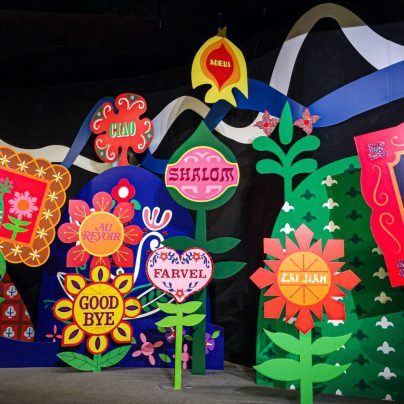
I sat in a ward council meeting and listened to men fret about statistics, about the percentages that represent the dwindling numbers of youth who remain in the church. “Sixty percent of missionaries come home early,” they said with shaking heads, “and eighty percent of youth stop church attendance after leaving their parents’ homes.” 80%. According to this statistic, the majority of young members are finding different paths outside of Mormonism.
The men who filled the bishop’s office were saddened by these statistics but I wasn’t because I know these migrating youth are finding meaning beyond the male-dominated institution of the church. In James Fowler’s book, Stages of Faith, he declares that “We (humans) require meaning,” and I see people leaving institutions because they cannot find deep and lasting meaning; they are searching elsewhere for that meaning they require. This suggests to me that patriarchy is failing – fluidity is softening rigidity. I find hope in the idea that many young adults will no longer support or commit to patriarchal institutions that do not reflect their ethics, thoughts, and beliefs. These youths are finding and creating meaning in new ways. This is liberating.
These 60% and 80% of young adults are screaming in a language that male power finally understands: numbers. Maybe I am being too optimistic, but these numbers seem to illustrate the decay of the world men have shaped and created. The patriarchal world (that industrious, hierarchical, exclusive, destructive world that men have built) has never worked for the majority – but now the church is finally paying attention because it is no longer able to maintain its numbers.
The question in ward council should never be about statistics or attendance or commitment to an institution; it should be: how do we become a people who prioritize divinity, wisdom, and acceptance for all the weary travelers who cross through our doors on the way in and on the way out? But again, I’m the wrong gender and speak the wrong language to be heard.
Richard Rohr, in his book Falling Upward, realizes that “people who are doing helpful and healing ministry find their primary support from a couple of enlightened friends and only secondarily, if at all, from the larger organization.” I see this constantly. This is what I see in the stats: “the larger organization,” patriarchy, is failing so people are looking elsewhere. Soul work cannot be marked on a roll or commodified or capitalized or monopolized, and, therefore, is not the priority of patriarchy. The institution of the church is failing to heal the wounded, feed the hungry, and listen to the outcast, so humans are doing it elsewhere, creating it for themselves with enlightened friends. This is what those statistics say to me as a female with no voice in a room full of men: Finally, the numbers are saying what we have been saying for decades.
While I sat in that ward council meeting, a line from Ursula LeGuin’s essay, “A Band of Brothers, a Stream of Sisters,” kept running through my mind: “When women manage to join the institutions that excluded them, they mostly end up being co-opted by them, serving male ends, enforcing male values.” Tragically, yes. She sees me and all the other women in this institution who serve male ends and enforce male values because we love religion and ritual and community and don’t know how to leave the people we love. We may create covens outside the church but within it, we serve male ends and enforce male values. We have managed to remain in an institution that excludes us, that speaks its own language, and ignores all else. But the majority of youth are refusing this. And as I sat in a room full of men, all representatives of a male-shaped institution, and listened to exclusively men enforce male values, I had much admiration for those 80% who leave this static place. They are speaking the language patriarchy understands – something I have been incapable of doing.
I have found meaning within the church but have given up so much to continue attending. That is why I do not grieve the 60% or the 80%, I celebrate them. In fact, I adore and love and know these youth who are leaving the institution behind; they are my son and my daughter and their friends. They are five of my siblings and their spouses. They are my husband and dad and neighbors – and they have outgrown the church they were raised in. I believe they are finding helpful and healing ministry outside the rigid structures of patriarchy, I believe they are refusing to be co-opted into enforcing exclusively male values and ends, I believe they are creating meaning together, and I believe they are speaking in a language that the church will hear.
November 9, 2022
Anxiously Engaged
Verily, I say, men should be anxiously engaged in a good cause, and do many things of their own free will, and bring to pass much righteousness. For the power is in them, wherein they are agents unto themselves. And inasmuch as men do good they shall in nowise lose their reward (Doctrine and Covenants 58:27-28).
Before I met him, my husband had never been to a protest. It’s fair to say he never even thought about protesting. It wasn’t that he didn’t care about people. It’s just that the world mostly functioned for him.
But that isn’t true for the majority of people in the world. Most people face discrimination or oppression at some point in their lives simply because of how God made them.
So here we are, my husband and I, after 27 years of marriage, raising a generation of activists. Each of our children has engaged politically, sometimes by canvassing for votes, sometimes by writing letters or testifying before the state legislature.
For me, activism is a holy calling. I’ve prayed and fasted to know what direction God wants me to take, and I always come back to his statement:
Cry aloud, do not hold back; Lift up your voice like a trumpet
(Isaiah 58:1)
I’ve felt God’s presence in the most unusual places: the state capital while lobbying for queer youth; listening to asylum seekers talking about escaping violence; holding rainbow umbrellas to protect Black youth while they call for racial justice. I know it’s God because it feels like the temple: joy, and peace, and God’s arm around me even when the activism is hard.
In my distress I called to the Lord;
I cried to my God for help.
From his temple he heard my voice;
my cry came before him, into his ears.
(Psalm 18: 6)
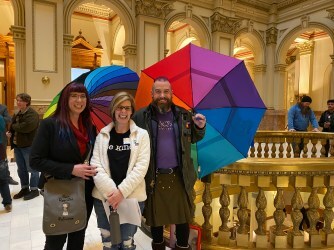
Me with the co-founders of Parasol Patrol, at the state capital as we advocate for pro-LGBTQ legislation.
Sometimes, our whole family protests together. Protesting brings awareness to issues, builds solidarity, and lifts voices that would otherwise be relegated to a footnote in some obscure history book. Mostly, protests are tame. For example, when protesting the antifeminist and anti-LGBTQ policies of Education Secretary Betsy DeVos, children made up the majority of our group of roughly 200 people. We marched from the state capital to the hotel hosting DeVos. Chanting my favorite call and response, “Show me what democracy looks like! This is what democracy looks like!” we circled the block for roughly an hour. Afterward we got ice cream because protesting can be hot work.
Set up a banner on the bare mountain! Lift up your voice to them!
(Isaiah 13:2)

Protesting Education Secretary Betsy DeVos
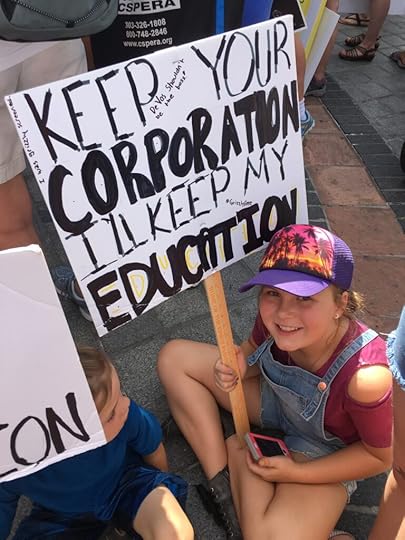
In your associations one with another, build and strengthen one another. ‘No man is an island; no man stands alone.’ We so need help and encouragement and strength, one from another . . . . It is a responsibility divinely laid upon us to bear one another’s burdens, to strengthen one another, to encourage one another, to lift one another. (Teachings of Gordon B. Hinckley, p. 45).
Because oppression of one person affects all of us, we can be found at protests that, at first glance, don’t appear to be our personal issue. When the federal government’s zero tolerance policies separated thousands of children from their families, we added our voices and our presence to the protests organized by local Latiné advocacy groups. Previously, we had met with a broad range of communities, from Syrian refugees to Nigerian asylum seekers, to celebrate immigration on National Immigration Day. This time, we held signs that conveyed our belief that immigration is a fundamental human right. My husband’s sign echoed what many of us were thinking at the time.
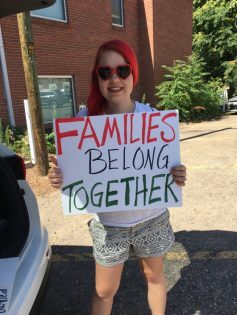
Protesting ICE immigrant separation policies.
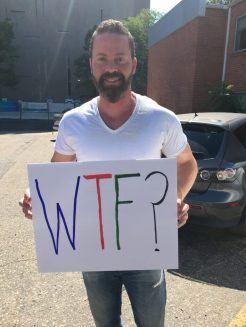
Some activists have a strict nonviolence policy. They reason that honey catches more flies than vinegar, and if we want to attract the complacent middle, we have to be respectable. Certainly, images showing State violence in the face of active nonviolence can change hearts. The black and white photos of the National Guard opening fire on peaceful Kent State students proved a turning point in US engagement in Vietnam.
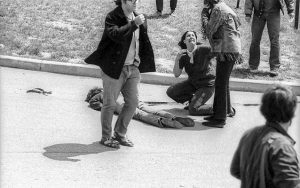
The Kent State Massacre included students on their way to classes.
Likewise, many of us remember the single student standing in front of a line of tanks in Tiananmen Square.

Pro-democracy protestor blocking tanks in Tiananmen Square, Beijing.
Even more of us remember the video of Buffalo Police shoving a 75 year old man to the ground, fracturing his skull and causing a brain injury. Mr. Gugino was a member of the Western New York Peace Center and a lifelong peace activist who was left lying, bleeding, on the ground as the police marched around him.

Police shoved a protestor to the ground when he attempted to return a helmet that had fallen off of one of the police.
There is a time and place for more disruptive measures. The fight for disability rights made little movement until 100 people spent weeks occupying the Health, Education and Welfare offices in San Francisco. In Denver, 19 disabled people laid down in front of a bus in the middle of a busy street, stopping traffic, to protest public transit inaccessibility. In 1990, Congress refused to move forward with the Americans with Disabilities Act. In response hundreds of demonstrators left their wheelchairs and crutches to crawl up the marble steps on the Capitol. Many of the protestors were arrested, including Anita Cameron who has been arrested over 125 times while advocating for the Disabled community.
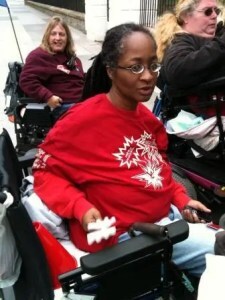
Anita Cameron of ADAPT
Water protectors stand in the way of heavy machinery, facing off against water cannons in the middle of winter. Their activism involves great personal risk and we are all the beneficiaries.

Water protectors advocate for safe water and protection of sacred land.
There comes a point when we’ve swallowed all the oppression we can hold. My own community engages in disruptive protests that sometimes turn violent. Stonewall was not the first time the trans community, led by trans people of color, protested police violence. The Compton Cafeteria protests arguably ignited the fire, Stonewall fanned the flames, but we’re still fighting for basic protections for trans people. Those in power never voluntarily relinquish power, and sometimes it takes a few pennies thrown at oppressors to get our point across.
Solidarity comes full circle. During the summer of 2020, my oldest child joined others calling for an end to the ongoing state sanctioned murder of the Black community. Just as Black trans people literally fought for my queer child’s right to live safely, my child added their voice to millions of others calling for systemic change. Oppressions, and solidarities, work together. The question is, what side do we stand on?
While I would like to say that marching against DeVos altered the landscape, it was really just one small drop in the tide of change that will take thousands of such drops across the nation, around the world. I would like to report that the summer of 2020 led to the implementation of transformative justice practices, but it did not. Change happens slowly, and it takes multitudes of people, thousands of chants and hundreds of signs, petitions, votes, letters, phone calls, and editorials, to move those who are complacent. But I think we can get there.
Audre Lorde said, “Every woman has a well-stocked arsenal of anger potentially useful against those oppressions, personal and institutional, which brought that anger into being. Focussed with precision it can become a powerful source of energy serving progress and change. And when I speak for change, I do not mean a simple switch of positions or a temporary lessening of tensions, nor the ability to smile or feel good. I am speaking of a basic and radical alteration in those assumptions underlining our lives.”
Protesting doesn’t always feel good. I’ve had things thrown at me, been flipped off, shouted at, threatened, and mocked. When that happens, I remember all the gall I’ve had to swallow, the bitter taste of oppression my siblings around the world are still being fed, and I let the anger work in me. We desperately need a radical alteration in the assumptions that underline systemic oppression, not just for one community, but for all of us who live with the cruelty of a repressive system.
What happens to a dream deferred?
Does it dry up
like a raisin in the sun?
Or fester like a sore–
and then run?
Does it stink like rotten meat?
Or crust and sugar over–
like a syrupy sweet?
Maybe it just sags
Like a heavy load.
Or does it explode?
“Harlem” by Langston Hughes
November 8, 2022
Guest Post: I Dated a Sexual Predator
Guest Post by Sabra. Sabra is an avid English and Spanish speaking, world traveling, Netflix watching, body liberationist, yogi who loves haggling, listening to podcasts and contributing to news literacy.

Once upon a time, I dated a sexual predator.
Unfortunately, I was ripe for the picking. I was in between apartments and living with my parents, who were still moderately abusive towards me in my twenties. As a result of many factors, I started developing co-dependent caretaker behaviors as a young child. I routinely sought people to fix, help, and love. Looking back through my life I can easily see that each of my closest relationships featured me as the caretaking, do-it-all, put-up-with-it-all, long-suffering friend or girlfriend. My counterparts in these relationships were emotionally unavailable, manipulative, inconsistent, and immature. I chose needy, demanding, and punishing people because I was trying to retroactively heal my relationships with my earliest caregivers who displayed the same behaviors.
Consequently, I ended up in more abusive, and profoundly harmful relationships. The sexual predator I dated was an investigator who got baptized into my YSA ward. He possessed only some of what I wanted in a romantic partner but pressure from the culture at large, my Black American culture specifically, Mormon culture, many isms, and my sister acting under the influence of her own distortions, led me to believe that he was worth pursuing and holding onto. He wasn’t. I was pressured to adhere to a culturally specific form of sexism that says my primary purpose is to save, heal and rescue Black American men from a cruel world that oppresses and devalues them. The idea is that my Black American female life is easier, therefore my social and familial role is protector, long sufferer, and political mobilizer for my brothers, father, and male partners over anyone else including myself and other women.
I am required to see my value and worth as secondary to his. If I have to put up with a volatile and emotionally unresolved partner, that’s the price for healing my people. My sister said, “You have to accept that Black men are going to have severe issues and problems. If you want one, you have to put up with a lot of awful things. They need and deserve our patience and love, more than we (Black American women) deserve loving, stable, and kind romantic partnerships.” The cultural script demanded it.
My relationship with the man who eventually raped me started fairly simply. We met at my YSA ward and became friends on social media. Later, we hung out with other members of our ward. Then, we started dating after I returned to my home city because I could no longer afford my college apartment. From the beginning, I knew that many things about him weren’t right, cue my oppressive multi-cultural script. So, I kept going. Also, I had little idea of what an abusive relationship looked like in the early stages, especially abuse that wasn’t physical.
It didn’t take long before he started to show his true colors. He complained that I wouldn’t engage in enough public displays of affection which was proof that my sex drive wasn’t high enough. Therefore, he may never be sexually happy with me and he needed some space to think. He complained that I wasn’t appreciative or submissive enough to my parents and implied that only he knew the value of having a father (because his biological father was absent). He wouldn’t accept that his perspective was limited, that he had unresolved relationships of his own with his stepfather and biological mother, even when yelling at his mother on the phone. He told me, “I only choose relationships where I’m the one in control” and when describing me to other people said, “she knows her place.” I was only 21.
I knew these were red flags. He himself was nothing if not a big red flag. However, the polite, long-suffering, co-dependent part of me thought I could change him. The part of me pressured by my emotionally immature older sister to stand by my manipulative, coercive, emotionally volatile man held strong. Moreover, the part of me that believed so strongly in the patriarchal blessing and the patriarch who told me that I’d get married at a young age led me to believe that this was what God had meant for me.
A relationship with this man was destabilizing, to say the least. He routinely ghosted, withdrew emotionally, and then intensely, made passionate declarations, only to tell me days later that he was again unsure of our future. When I suggested taking a relationship break, he said, “I’m afraid I might hurt myself. I can’t be without you. I don’t want to see you with anyone else.” I suggested therapy and relationship education. He responded, “I don’t want to work on the relationship. Can’t we just have a relationship?” The only thing he was consistent about was willfully misunderstanding me, interacting with his ex-girlfriend on social media, and grooming me for what was to come later.
I was working to get out of this relationship because my fix, heal, and repair strategies were dismissed or invalidated by him. I was drowning. Meanwhile, he was actively pushing, demanding, sulking, and controlling. He pushed me into getting engaged, notifying everyone in my family (in front of him), and giving in to sexual activities that I didn’t want. Interestingly enough, I lived with my parents at the time, and they said very little. However, my dad did display anger and controlling behaviors at the two of us after staying out all night. In contrast, I have never witnessed my dad act angrily at either of my brothers for staying out all night in their
early 20s.
It is clear to me now that my parents, even as self-proclaimed experienced 60-somethings had no idea that I was in an abusive relationship. My parents didn’t know that I was trying so hard to get away from the man I was engaged to or that most of our relationship was non-consensual, coerced, manipulated, and fast-tracked by him. In some ways, my family was even complicit. My father and brother had a conversation with this abusive man and told him to make sure that I didn’t end up running the relationship. After this conversation, the dynamics in this relationship got worse for me and the man who had been grooming me for months raped me in my apartment. After a tumultuous relationship filled with coercion, shaming, blaming, and contempt, the man who raped me let me go. It was incredibly messy and fraught.
However, after months of verbal, emotional, and sexual violence, he broke up with me through a text message. “I can’t do this anymore,” he said. I wish I could say that was the end, but it wasn’t. I insisted on seeing him face to face and having it out. So, we did, and he said, “It’s not like I raped you. It takes two to tango.”
Years later I wondered what would have happened if only my family, community, church, schools, etc. knew what abusive relationships looked like in the early stages. If only these lessons were taught in place of modesty or typing. This is what happens when a church, education system, and family hold such rigid gender views and fail to teach consent, sexual citizenship, or respect for women. This rape culture is what allowed this man and people like him to thrive in our global society. Developing the ability to discern between harmful behavior patterns and healthier behaviors could have prevented me from entering an abusive relationship with a man who abused me for months and raped me several times. He, like most men who rape women received zero consequences legally or socially. All of our mutual social media friends continued to be his friend, even though at least one of them knew that he raped me.
When I told her that he raped me, she answered, “Are you sure you’re not just saying that because you’re mad that he broke up with you?” They are still friends (maybe more) on social media to this day. Back when this all happened, I went to my college bishop and to the bishop of the man who abused and raped me. However, neither bishop showed an understanding of abusive relationships or relationship rape. Therefore, they issued out church consequences and I went without temple trips and the sacrament for the next several months convinced that I had engaged in the almost unforgivable. It took months before I realized what he did, and who sat by and
watched.
November 7, 2022
Personal Revelation and the “Ideal”
This is a reprint of a post I wrote back in 2010 at my personal blog under a pseudonym. Twelve years later, it’s still just as relevant as the day I wrote it.
[image error]Pexels.com","created_timestamp":"0","copyright":"","focal_length":"0","iso":"0","shutter_speed":"0","title":"question marks on paper crafts","orientation":"0"}" data-image-title="pexels-photo-5428836" data-image-description="" data-image-caption="Photo by Leeloo Thefirst on Pexels.com
" data-medium-file="https://i0.wp.com/www.the-exponent.co..." data-large-file="https://i0.wp.com/www.the-exponent.co..." decoding="async" loading="lazy" width="1880" height="1255" src="https://i0.wp.com/www.the-exponent.co..." alt="question marks on paper crafts" class="wp-image-55016" srcset="https://i0.wp.com/www.the-exponent.co... 1880w, https://i0.wp.com/www.the-exponent.co... 300w, https://i0.wp.com/www.the-exponent.co... 1024w, https://i0.wp.com/www.the-exponent.co... 768w, https://i0.wp.com/www.the-exponent.co... 1536w" sizes="(max-width: 1000px) 100vw, 1000px" data-recalc-dims="1" />Photo by Leeloo Thefirst on Pexels.comI find the rhetoric used in the church to describe the “ideal” to be off-putting. It’s usually trotted out in the context of family relations, but it can apply in other situations as well. It goes something like this: The “ideal” is a man and a woman who married in the temple in their early 20’s (after the man served an honorable full-time mission), upon which the woman got pregnant within a year or two, quit her job, and became a full-time homemaker. [1] Any other situation is “less-than-ideal” and is something that the parties to the situation should feel at least slightly bad about. We can’t acknowledge these situations with more than a few off-hand comments in talks because if we focus too much on them, then the “ideal” will be compromised.
In addition to causing heartache and pain to members whose lives have, for whatever reason, taken a different path, this notion of the “ideal” is in direct contradiction to our belief in personal revelation. Personal revelation comes through the Holy Spirit, a member of the Godhead. How could following instruction from God be less than ideal?
If someone receives personal revelation on a subject that differs from the “ideal”, that doesn’t make acting on that revelation not ideal. That revelation creates, for that person, a different ideal. For example, I have a good friend who became very close friends with a man not of our faith. As they got closer, she prayed about it and received a prompting to marry him. She was quite surprised by this, and she asked again to make sure she had understood correctly. She had. They’ve been married for 10 years, and they have a wonderful marriage and family. Marrying him became her ideal.
Personal revelation can serve to liberalize, as in the above instance of marrying a nonmember, but it can also serve to make things stricter for a given individual. For example, men are expected to serve a mission, and women are not. [2] When I reached the age where I was making the decision of whether or not to serve a mission, I received a witness that I should go. This revelation, which came from God, made my personal obligation to serve equal to the obligation of any man. Serving a mission became my ideal, and I would have been disobedient to God if I had chosen not to serve.
Instead of using the term “ideal” to describe the default position, I propose we use a different term which can avoid the baggage of value judgments. Perhaps something like “general rule”, “default”, or another suitable synonym. Basically, the idea is “do this unless you have revelation to do it differently”. This phrasing is consistent with how Elder Oaks frames the issue. He has said:
As a General Authority, I have the responsibility to preach general principles. When I do, I don’t try to define all the exceptions. There are exceptions to some rules. . . . But don’t ask me to give an opinion on your exception. I only teach the general rules. Whether an exception applies to you is your responsibility. You must work that out individually between you and the Lord.
The Prophet Joseph Smith taught this same thing in another way. When he was asked how he governed such a diverse group of Saints, he said, “I teach them correct principles, and they govern themselves.” In what I have just said, I am simply teaching correct principles and inviting each one of you to act upon these principles by governing yourself. [3]
As a people who believe in personal revelation, we need to make our speech consistent with our doctrine.
—
[1] In talking about the rhetoric of the “ideal”, I don’t mean to imply that there’s anything wrong with marrying young or being a full-time homemaker.
[2] See e.g. Gordon B. Hinckley, “Some Thoughts on Temples, Retention of Converts, and Missionary Service”, October 1997 General Conference, reprinted in November 1997 Ensign p. 49. Available here. (Accessed April 7, 2010). (“I say what has been said before, that missionary work is essentially a priesthood responsibility. … We do not ask the young women to consider a mission as an essential part of their life’s program. … Again to the sisters I say that you will be as highly respected, you will be considered as being as much in the line of duty, your efforts will be as acceptable to the Lord and to the Church whether you go on a mission or do not go on a mission.)
[3] Dallin H. Oaks, “Dating versus Hanging Out”, CES Fireside May 1, 2005. Available here. (Accessed April 7, 2010).



